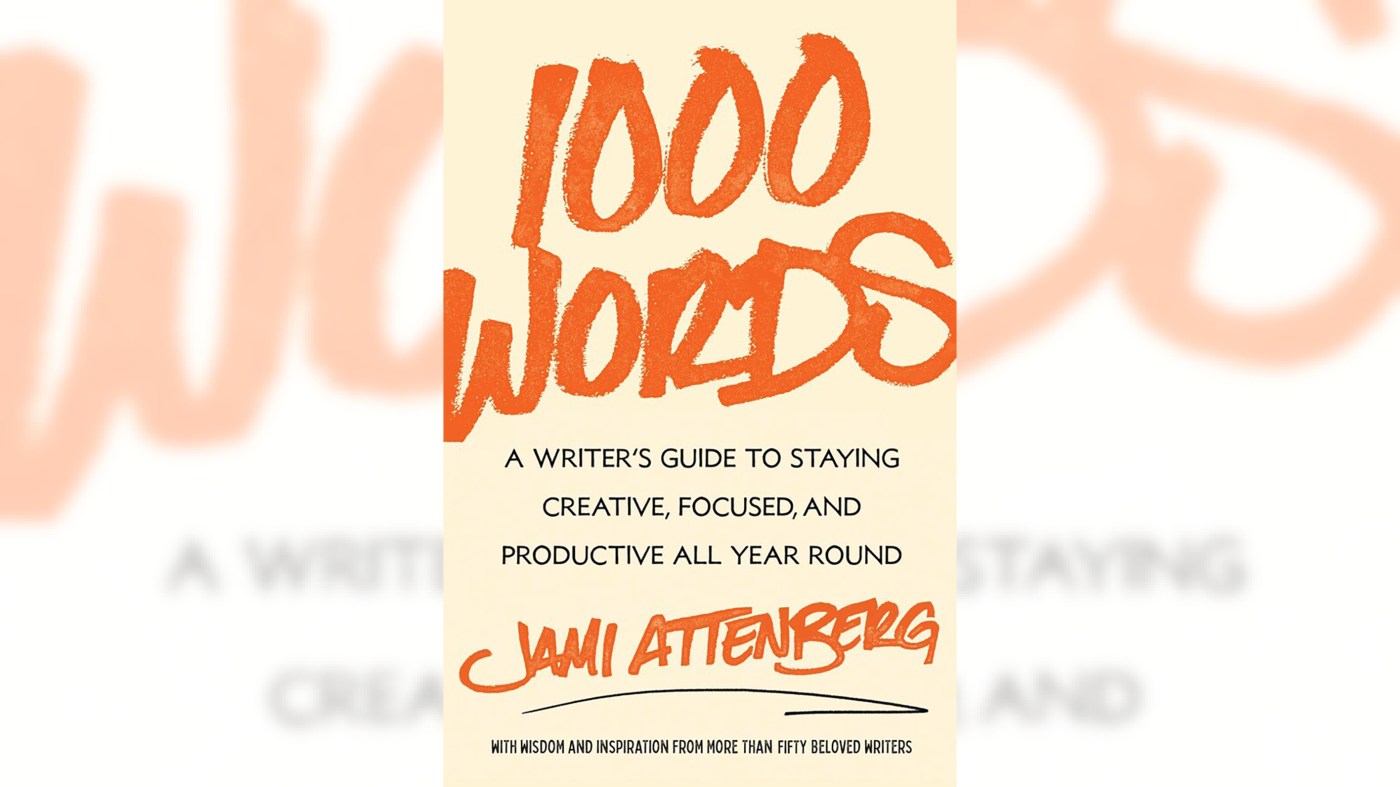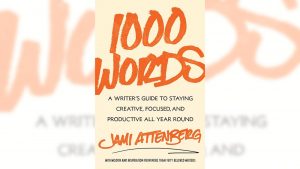
Jami Attenberg on her book ‘1000 Words: A Writer’s Guide to Staying Creative, Focused, and Productive All Year Round’
Writing this sentence was hard.
There were so many other things I could have gone with. That set of words seemed right at the time, roughly 90 seconds ago. Now I’m not so sure. Joan Didion once said that writing the first sentence of anything is difficult but by the time you’ve written two, you’re committed and should just keep plowing ahead. The problem is, self-doubt is part of the process. If you began January certain this would be the year you finally wrote a book, and now it’s late March and you’re still frozen in fear, you understand. You need motivation. You need someone like Jami Attenberg, of Chicago suburb Buffalo Grove, in your head. She has this new book, “1000 Words: A Writer’s Guide to Staying Creative, Focused and Productive All Year Round,” which is sort of the advice book equivalent of that friend who cheers beside a marathon route, tossing out enthusiasm and Gatorade.
It’s intended that way, Attenberg told me. She imagines people leaving her book on their desks and, whenever they can’t get started, reaching for words of unabashed support.
Better her than me.
“1000 Words: A Writer’s Guide to Staying Creative, Productive and Focused All Year Round,” by Jami Attenberg. (Simon & Schuster/TNS)
I hate writing. I mean, I do it for a living, and I love it much of the time; there are those days when it brings a buoyant flush of confidence. But I also hate writing much of the time, too. Because it never gets easier. I once assumed it would. Years ago, when I was in college, on a whim, eager for advice, I called Roger Ebert at the Sun-Times and he answered his phone and I asked him how he was able to write so much, and he said he had a deadline right now and he didn’t have time to talk — which itself was an answer.
Writing advice arrives in many forms. The diaries of famous authors are windows into the struggle. Biographies, too. Chicago’s popular StoryStudio offers classes that guide you through finishing a book in one year. Rebecca Makkai, the acclaimed Chicago-based novelist, is its artistic director. During one of the many pitstops in Attenberg’s book, Makkai notes that her own first book took 10 years to finish, partly because she had children, and partly because she lost faith in what she was writing. Which is less than comforting. There are also classics on writing, full of practical advice both comforting and harrowing — Stephen King’s “On Writing,” William Zinsser’s “On Writing Well,” Anne Lamott’s “Bird by Bird.”
Attenberg, though, has never read a book of writing advice. When she began this one, she imagined she was writing something motivational and repetitive, like the self-help book she once read to stop smoking. Sometimes you need encouragement. So six years ago, Attenberg was sitting with a writer friend, talking about the difficulty of staying motivated. They decided to put themselves through a self-invented two-week boot camp of sorts. The goal was to write 1,000 words a day. After two weeks they’d have 50 pages of a book. Attenberg went online, tweeted about the project and soon, hundreds of strangers were joining them, committed to finishing 1,000 words every day for two weeks. Understand: At this point in her career, Attenberg had already written six books, including the bestselling novel “The Middlesteins.” She still needed motivation.
That’s how awful writing is.
Yet — get this — she loves writing.
“It’s fun,” she said. “I always felt this way. When you don’t have a lot of friends as a kid, it’s a way of making them. In Illinois, growing up, I was a nerdy bookworm. It felt natural to create playgrounds in my head. I’m 52 now and it’s still the most joyful thing — a great way to know yourself. I am writing books I want to read. I don’t hate writing like you say.”
In my defense: The euphoria you get from writing something you can stand is fleeting. James Baldwin, who said many smart things about so many things, has one of the smartest lines ever about the pain of writing: “Beyond talent lie all the usual words: discipline, love, luck, but most of all, endurance.” He said the most important thing for a writer starting out is having someone who reads their work and says, “The effort is real.”
But how do you start?
Arthur Miller skipped spring break at the University of Michigan to write a play in six days. Norman Mailer flexed his skills by writing sci-fi that starred a shameless stand-in for Buck Rogers. Eudora Welty would dive right in, knocking out terrible first lines such as: “Monsieur Boule inserted a delicate dagger in Mademoiselle’s left side and departed with a poised immediacy.”
Attenberg was editor of the school newspaper at Buffalo Grove High School and a member of an after-school creative writing workshop. And like any writer at any age who is worth their stuff, she read constantly. (“I don’t know how far you can go if you don’t.”) She created story-filled zines and released them, one by one. These became her first book, a story collection. “I didn’t realize I was writing a book for a while there. I was just writing about dark visions of modern romance and putting them out, then a friend said I should do a book. But I struggled with what it meant to be a writer, and finding time to be one. Learning (story) structure was hard. I’m character driven and would happily have characters chit-chat. I struggled figuring out how to ‘make things happen.’
“The thing is, to start, you don’t go out Friday night. Write at lunch. Bring a notebook on public transportation. This writer, Deesha Philyaw, said be prepared to disappoint people. She meant her family. You carve from your life to support your creative self.”
And what if you suspect your idea is dumb?
Take heart. Dostoevsky said, “There is no subject so old that something new cannot be said about it.” When beginning a new book, John le Carré would remind himself: “‘The cat sat on a mat’ is not the first line… But ‘The cat sat on the dog’s mat’ could work.”
Attenberg knows she has something if she wants to go back to something she wrote. If she is hearing her characters days later, that’s a positive sign. “Usually, I will start to see scenes in the future. So I will write towards those scenes. I will see an ending and write towards it. But the ending is never the real ending, and it becomes a north star. I also have friends and editors who are great advisors, but you should never write towards a marketplace. It always changes. Write the thing you love and it’ll come across to others.
“I also don’t keep a list of ideas. I keep a list of titles. There’s always an idea in a great title. I keep tons of notebooks but I rarely go back to them. For new ideas, I might go to a mall and eavesdrop. You probably won’t find a great story on Twitter, but I do look at vintage clothing on Etsy. You imagine: Who might have owned this clothing? It’s a start.”
Terrific, now how do I stay focused?
Silence is helpful, but, you know, a lot of silence becomes distractingly surreal.
Attenberg listens to music, “but only sung in a foreign tongue or all instrumental.” I can’t write if there are lyrics at all in a piece of background music. Brian Eno’s dreamy soundscapes, such as the perfectly titled “Ambient 1: Music For Airports,” are ideal.
“Good one,” Attenberg said. “Movie soundtracks, too.”
Maya Angelou would rent a hotel room for a few months and leave her home at 6 a.m. every day and write on the hotel bed until 1:30 p.m. or so, then return the next day. Tennessee Williams would wake up before dawn and write with a glass of wine.
Yeah, but that sounds like people with money and time to stay focused.
I asked Attenberg how she figured out how to make money and stay a writer.
“I don’t know if I did,” she said.
Dear reader, if you still have dreams of being a writer but have a weak constitution for humility and struggle, stop reading here. Attenberg worked some in advertising, she was a temp, she would take off more time than allowed. “I went broke a bunch of times. For the first books, I was basically going back and forth between writing and another job. My family worried about me, but they also thought I made these decisions myself. I’d decided to focus on writing even if I didn’t become a bestseller. My fourth book was my breakthrough (“The Middlesteins”), but right before, I had no money in a bank, I had a lot of credit card debt, I didn’t have another career to go into and I had just been dropped by my publisher. Also, I was now 40 and couch surfing for long periods of time.”
For many, sleeping on couches at 40 would be a hard out.
Entire finished novels were scrapped. Advice from agents was left unheeded. None of this is remarkable or unusual for this profession. “Yet all along, I was making decisions to get me to this place,” she said. All of it — good, bad, soul-crushing — was part of becoming a writer. “It didn’t feel like a waste,” she said about the junked books, though the words sounded broader. “Sometimes you do something to get you to somewhere else. You go through the bad to get you to next thing. It’s all part of a bigger picture.”
Now start writing.
cborrelli@chicagotribune.com


